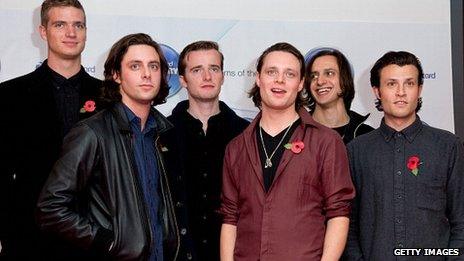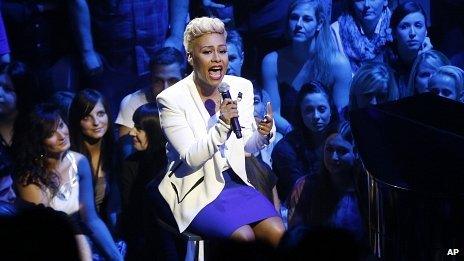Foals and The Maccabees play the 'long game'
- Published

Foals have released three albums since 2008
"Music is its own reward and making music is what you do it for, it's for the fulfilment and the beauty of the creative moment," says Foals frontman Yannis Philippakis on the driving force behind their growing success in what has been a tough climate for guitar bands.
The Oxford group play two shows at the Royal Albert Hall on 28 March, where they will perform to over 10,000 fans.
It follows the success of their third album Holy Fire, which has earned them favourable reviews and given them their highest UK chart position to date, at number two.
Apart from the music, what is it that has helped two bands of the last six years, Foals and their contemporaries The Maccabees, sustain a recording and touring presence at a time when it was said guitar music was dead?
Philippakis says when they first signed their record deal they did forgo certain things.
"We didn't sign for a lot of money because we'd heard the horror stories of getting signed for huge, exorbitant amounts of money and then you get dropped," he says.
"We wanted to be able to make music, so we sacrificed the paycheque in order to feel secure that we weren't going to be erased the next day," he adds.
Foals, who booked their own tours at the beginning, playing the house party scene in Oxford before any contact with the industry, were what the frontman describes as "aggressively protective" over their musical output and choices, down to cover artwork and producers.
"We don't come from a world where you get in a room with a songwriter and they write a top line for you and you have a hit," he says. "That's just an anathema to us."
Career band
London band The Maccabees have been on a similar trajectory to Foals.

The Maccabees were nominated for the Mercury prize in 2012
It has been six years since they released their first album, Colour It In, with Fiction - also a major label home to Elbow, whose tipping point came on their fourth album, the Mercury Prize-winning The Seldom Seen Kid.
With each subsequent LP, The Maccabees have achieved a higher chart position and have become a much sought-after live act.
Their most recent offering, Given To The Wild, earned them critical acclaim, a top 10 chart position and a Mercury prize nod.
Guitarist Felix White says of their label mentors: "Fiction have stuck by us and we haven't sold that many records, but we keep getting better I think."
Martin Mills, founder and chairman of the Beggars group, which is formed of 4AD, Matador Records, Rough Trade and XL and is home to Adele and The XX, says longevity is vital in the independent sector.
"You're looking for artists that are more than just one moment, people that we think can grow over a period of time and become even greater," he says.
Despite Foals and The Maccabees being signed to major labels, Mills said they were given the chance to grow "at a good pace" over three albums, "much to their credit".
Each of the four labels under the Beggars umbrella sign an average of three new acts a year, offering just twelve opportunities for all those emerging acts vying for the company's support.
"When you are managing the career of a band it's important to drive with your foot on the brake as much as on the accelerator pedal, maybe say no to opportunities that come too early and think more for the long game," says Mills.
Different landscape
In the last decade, the music industry has been adapting to falling record sales, the digital revolution and the rise of social media and piracy, all at a time of economic struggle.
"I think it's a less feasible thing for kids now, because of the difficulties financially in music," says White.
"You hear how there isn't any money, how you're never going to get a career out of it, how bands don't get signed, how difficult it is."
In 2010, Warner Music vice-president Mark Robinson, said the fixed cost in breaking an artist is around $1million (£621,000).
Mills says it often doesn't cost as much these days because of the "constrained economy" and cheaper recording costs.
And Mike Walsh, head of music at alternative radio station Xfm, says labels are still taking risks on indie acts.

2012 was dominated by pop artists like Ed Sheeran and Emeli Sande (pictured)
"I don't think that overnight people are going to stop listening to pop music but I think there seems to be a really strong set of new emerging British artists, who all feel like they could be career contenders," he says, going on to mention artists like Lewis Watson and The 1975.
White sees the strong independent scene as a "knee-jerk reaction" to the disposable way people are able to consume music.
"It becomes comforting to have those things and people react against it and support music that is supposedly there for a long time," says the musician.
As for the "long game", Philippakis can't say whether he will still be touring with Foals in a decade's time.
"I think there's something quite undignified about hammering it," he says. "Maybe I'm going to end up with egg on my face and we'll still be doing it when we're 40.
"I would definitely like to make another record but beyond that, who knows? I might just want to go swimming or something, go on holiday," he laughs.
Both Foals and The Maccabees contend that being childhood friends, some luck and high quality control has helped them carve a path to success, which should see them around for a little while longer at least.
"We wrote this record in the same studio that me and Jack (Bevan, drummer) practiced in when were 15-years-old," says Philippakis. "It's a tiny little box that you can rent for £15 a day.
"You can make music with anything, anywhere and people should remember that."